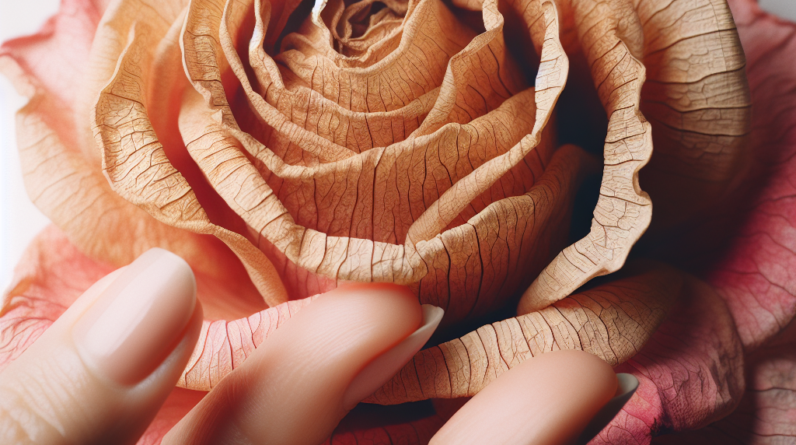
As you gracefully embrace the journey of aging, maintaining a beautiful and radiant complexion becomes a priority. When it comes to caring for aging skin, it’s essential to choose the right products and adopt healthy skincare procedures. In this article, you will discover the key elements of a good foundation for aging skin, aiding you in preserving a youthful glow that radiates from within.

Skincare Routine
Taking care of your skin is essential, especially as you age. Establishing a skincare routine can help maintain the health and radiance of your skin. Here are some crucial steps to include in your daily skincare regimen.
Cleansing
Cleansing is the first step in any skincare routine. Properly cleansing your skin removes impurities, excess oil, and makeup, allowing your skin to breathe and prevent breakouts. Look for a gentle cleanser that suits your skin type, whether it is dry, oily, or combination skin. Avoid harsh cleansers that strip away natural oils and leave your skin feeling dry and tight.
Exfoliating
Exfoliating is an important step to incorporate in your skincare routine to promote cell turnover and remove dead skin cells. By exfoliating regularly, you can reveal a smoother and brighter complexion. Look for a gentle exfoliator that won’t irritate your skin. Exfoliate your skin 2-3 times a week, but be careful not to overdo it, as excessive exfoliation can cause irritation.
Toning
Toning is a step often overlooked but can bring significant benefits to your skincare routine. Toning helps balance the pH of your skin, tighten the pores, and remove any remaining impurities. Look for a toner that is alcohol-free to avoid drying out your skin. Apply toner with a cotton pad and gently swipe it across your face and neck.
Moisturizing
Moisturizing is an essential step in any skincare routine, regardless of your skin type. As you age, your skin tends to become drier, so using a moisturizer is crucial to keep your skin hydrated and supple. Choose a moisturizer that suits your skin type, whether it is a lightweight lotion or a richer cream. Apply moisturizer after cleansing and toning to seal in moisture and protect your skin from external aggressors.
Using SPF
Protecting your skin from harmful UV rays is vital, even on cloudy days. Sun exposure is one of the primary causes of premature aging, including wrinkles, age spots, and sagging skin. Incorporate a broad-spectrum sunscreen with at least SPF 30 into your daily routine, and reapply every two hours if you are spending time outdoors. Look for a sunscreen that is lightweight and easily absorbed by your skin.
Ingredients to Look for
When choosing skincare products, paying attention to the ingredients can make a significant difference in the health and appearance of your skin. Here are some key ingredients to look out for in anti-aging skincare products.
Retinol
Retinol, a derivative of vitamin A, is a potent ingredient known for its anti-aging properties. It helps promote cell turnover, reduce the appearance of fine lines and wrinkles, and improve overall skin texture. Incorporating retinol into your skincare routine can help combat signs of aging and give your skin a more youthful appearance. Start with a low concentration and gradually increase usage to avoid any potential irritation.
Vitamin C
Vitamin C is a powerful antioxidant that can help brighten your skin, even out skin tone, and stimulate collagen production. It helps protect your skin against environmental damage, including sun exposure and pollution. Look for serums or moisturizers that contain stable forms of vitamin C, such as ascorbic acid or sodium ascorbyl phosphate. Incorporating vitamin C into your routine can help achieve a radiant and glowing complexion.
Hyaluronic Acid
Hyaluronic acid is a hydrating ingredient that can hold up to 1000 times its weight in water. It helps plump and moisturize the skin, reducing the appearance of fine lines and wrinkles. Hyaluronic acid is suitable for all skin types and can be found in various skincare products, including serums, moisturizers, and masks.
Peptides
Peptides are amino acids that can help stimulate collagen production and improve skin elasticity. They assist in reducing the appearance of wrinkles and promoting a firm and smooth complexion. Look for products that contain peptides to enhance the anti-aging benefits of your skincare routine.
Antioxidants
Antioxidants, such as green tea extract, resveratrol, and vitamin E, help protect your skin from free radicals and environmental damage. They can help prevent premature aging and improve the overall health of your skin. Look for products that are rich in antioxidants to incorporate into your routine.
Importance of Hydration
Hydration plays a crucial role in maintaining the health and vitality of your skin. Here are some tips to ensure adequate hydration for your skin.
Drinking Sufficient Water
One of the easiest ways to hydrate your skin is by drinking enough water. Aim to drink at least eight glasses of water per day to keep your skin hydrated from within. Water helps flush out toxins, deliver essential nutrients to your skin cells, and promote a healthy complexion.
Using Hydrating Skincare Products
In addition to drinking water, using hydrating skincare products can provide an extra boost of moisture to your skin. Look for moisturizers, serums, and masks that contain hydrating ingredients such as hyaluronic acid, glycerin, or ceramides. These ingredients help lock in moisture and keep your skin hydrated throughout the day.
Humidifying Environment
Creating a humidifying environment can also help keep your skin hydrated. Using a humidifier in your home or office can counteract the drying effects of heating or air conditioning systems. It helps add moisture to the air, preventing your skin from becoming dry and dehydrated.
Specialized Skincare Products
Beyond the basics of cleansing and moisturizing, there are specialized skincare products that can target specific areas or concerns. Here are some products to consider incorporating into your routine.
Serums
Serums are concentrated formulas that contain active ingredients designed to penetrate deep into the skin. They can address specific concerns like brightening, reducing wrinkles, or improving skin texture. Look for serums that target your specific skincare needs and apply them after cleansing and toning, before moisturizing.
Eye Creams
The delicate skin around the eyes is prone to fine lines, puffiness, and dark circles. Using an eye cream can help hydrate and nourish this area, reducing the signs of aging and tiredness. Look for eye creams that are gentle, fragrance-free, and specifically formulated for the delicate eye area. Apply a small amount with your ring finger and gently pat it around the orbital bone.
Neck and Decollete Creams
The neck and decollete area are often overlooked but can show signs of aging, including sagging skin and wrinkles. Using a dedicated neck and decollete cream can help firm and tighten this area, promoting a more youthful appearance. Look for creams that contain ingredients like peptides, retinol, or hyaluronic acid to target the specific concerns of this area.
Night Creams
Nighttime is the optimal time for your skin to repair and regenerate. Using a night cream can provide extra hydration and nourishment while you sleep. Look for night creams that are richer in texture and contain ingredients that support overnight skin renewal, such as antioxidants, peptides, or hyaluronic acid.

Avoiding Harsh Products
Some skincare products can do more harm than good, especially for aging skin. It’s essential to avoid harsh ingredients and products that can cause irritation or damage to your skin. Here are some products to steer clear of.
Alcohol-Based Cleansers
Alcohol-based cleansers can strip away natural oils and disrupt the skin’s barrier, leading to dryness and irritation. It’s important to choose cleansers that are gentle and alcohol-free to maintain the health and hydration of your skin.
Fragrance-Loaded Products
Fragrances can be irritating to the skin, especially for those with sensitive skin or conditions like rosacea or eczema. Look for fragrance-free or unscented products to minimize the risk of skin irritation and maintain a healthy skin barrier.
Excessive Scrubbing
Over-exfoliating or using harsh scrubs can lead to skin irritation and damage. It’s important to be gentle with your skin and choose exfoliators that are suitable for your skin type. Avoid scrubbing too vigorously or using abrasive ingredients that can cause micro-tears in the skin.
Nutrition and Diet
While skincare products play an important role in maintaining the health of your skin, a balanced diet and proper nutrition are equally essential. Here are some dietary tips to support healthy skin aging.
Consuming Anti-Inflammatory Foods
Foods rich in antioxidants and omega-3 fatty acids can help combat inflammation, which is a common factor in the aging process. Include foods such as berries, leafy greens, fatty fish, and nuts in your diet to help reduce inflammation and promote healthy skin.
Getting Adequate Omega-3 Fatty Acids
Omega-3 fatty acids are essential for maintaining healthy skin. They help support the skin’s natural barrier function, reduce inflammation, and promote overall hydration. Include food sources rich in omega-3 fatty acids, such as salmon, chia seeds, flaxseeds, and walnuts, in your diet.
Increasing Antioxidant Intake
Antioxidants help protect your skin against free radicals and oxidative stress. Include foods high in antioxidants, such as colorful fruits and vegetables, green tea, and dark chocolate, in your diet to support healthy skin aging.
Limiting Sugar and Processed Foods
Consuming excessive sugar and processed foods can contribute to inflammation and accelerate the aging process. Limit your intake of sugary snacks and processed foods and opt for whole, nutrient-dense foods instead. This can help maintain the health and vitality of your skin.
Exercise and Physical Activity
Regular exercise and physical activity not only contribute to overall well-being but also impact the health and appearance of your skin. Here’s how exercise can benefit your skin.
Improving Blood Circulation
Exercise helps improve blood circulation, delivering oxygen and essential nutrients to your skin cells. This increased blood flow can promote a healthy complexion and a natural glow.
Boosting Collagen Production
Collagen, a protein that gives your skin structure and elasticity, naturally declines as you age. Regular exercise, particularly strength training and resistance exercises, can help stimulate collagen production, resulting in firmer and more youthful-looking skin.
Reducing Stress Levels
Exercise is a natural stress reliever, promoting the production of endorphins, also known as “feel-good” hormones. By reducing stress levels, you can help prevent stress-related skin issues like acne breakouts and inflammation.
Promoting Overall Well-Being
Regular exercise is not only beneficial for your skin, but it also contributes to your overall well-being. Exercise helps regulate hormones, improves sleep, and boosts self-confidence, all of which can positively impact the health and appearance of your skin.
Importance of Sleep
Getting enough sleep is often underestimated when it comes to maintaining healthy skin. Here’s why quality sleep should be an essential part of your anti-aging skincare routine.
Repairing and Regenerating Skin Cells
During sleep, your skin goes into repair mode, allowing new cells to grow and damaged cells to be repaired. This process is vital for maintaining youthful and glowing skin.
Reducing Inflammation
Lack of sleep can lead to increased inflammation in the body, which can manifest as redness, puffiness, and acne breakouts on the skin. Prioritizing quality sleep can help reduce inflammation and promote a calmer complexion.
Preventing Premature Aging
Consistent lack of sleep can contribute to premature aging, resulting in fine lines, wrinkles, and uneven skin tone. By ensuring you get enough sleep, you can help prevent premature aging and maintain a youthful appearance.
Enhancing Skin’s Natural Glow
A good night’s sleep can significantly improve the appearance of your skin. With sufficient rest, your skin looks brighter, fresher, and more radiant, giving you a healthy and youthful glow.
Stress Management
While stress is a normal part of life, chronic stress can take a toll on your skin’s health and appearance. Incorporating effective stress management techniques into your routine can help maintain the wellbeing of your skin. Here are some stress management strategies to consider.
Practicing Relaxation Techniques
Engaging in relaxation techniques like deep breathing, meditation, or yoga can help reduce stress levels and promote a sense of calm. These practices can positively impact your overall well-being and contribute to healthy skin aging.
Engaging in Hobbies
Finding time for activities you enjoy can be a valuable stress reliever. Whether it’s painting, gardening, or playing an instrument, engaging in hobbies can help shift your focus away from stress and promote a more balanced lifestyle.
Seeking Emotional Support
If stress becomes overwhelming, seeking emotional support from friends, family, or professionals can make a significant difference. Talking through your feelings and concerns can help alleviate stress and improve overall mental well-being.
Maintaining Work-Life Balance
Achieving a healthy work-life balance is crucial for managing stress. Make sure to prioritize self-care, set boundaries, and allocate time for relaxation and activities outside of work. This can help reduce stress levels and improve the health of your skin.
Professional Treatments
In addition to a comprehensive skincare routine and a healthy lifestyle, professional treatments can provide targeted solutions for specific skin concerns. These treatments can enhance the effectiveness of your skincare routine and help you achieve optimal results. Here are some professional treatments to consider.
Chemical Peels
Chemical peels involve applying a solution to the skin to remove dead skin cells and promote cell turnover. They can improve skin tone, reduce the appearance of fine lines, and enhance overall skin texture. Consult with a dermatologist or skincare professional to determine the appropriate type and strength of chemical peel for your skin.
Microdermabrasion
Microdermabrasion is a non-invasive procedure that exfoliates the skin, helping to remove dead skin cells and improve skin texture. It can minimize the appearance of fine lines, acne scars, and hyperpigmentation. This treatment stimulates collagen production and leaves your skin looking fresh and rejuvenated.
Laser Therapy
Laser therapy involves the use of targeted laser energy to treat various skin concerns, including wrinkles, age spots, and uneven skin tone. It can help stimulate collagen production and promote skin tightening, resulting in a more youthful appearance. Consult with a dermatologist to determine if laser therapy is suitable for your skin.
Botox and Fillers
Botox and fillers are injectable treatments that can help reduce the appearance of wrinkles, fine lines, and sagging skin. Botox temporarily relaxes the muscles, smoothing out wrinkles, while fillers restore volume and plumpness to areas that have lost elasticity. Consult with a qualified medical professional to discuss these options and determine the best approach for your skincare needs.
Facial Massage and Acupuncture
Facial massage and acupuncture can provide numerous benefits for your skin, such as improved circulation, increased collagen production, and enhanced lymphatic drainage. These techniques can help reduce puffiness, increase radiance, and promote a more youthful complexion. Consider seeking the expertise of a licensed esthetician or acupuncturist to experience the benefits of facial massage or acupuncture.
In conclusion, establishing a comprehensive skincare routine that includes proper cleansing, exfoliating, toning, moisturizing, and sunscreen application is essential for maintaining healthy, youthful-looking skin. Paying attention to the ingredients in your skincare products, ensuring adequate hydration, and avoiding harsh ingredients or excessive scrubbing can further enhance the health and appearance of your skin. Additionally, incorporating a nutritious diet, regular exercise, sufficient sleep, stress management techniques, and professional treatments can all contribute to the overall well-being and longevity of your skin. By following these tips and strategies, you can achieve a beautiful and radiant complexion as you age.







